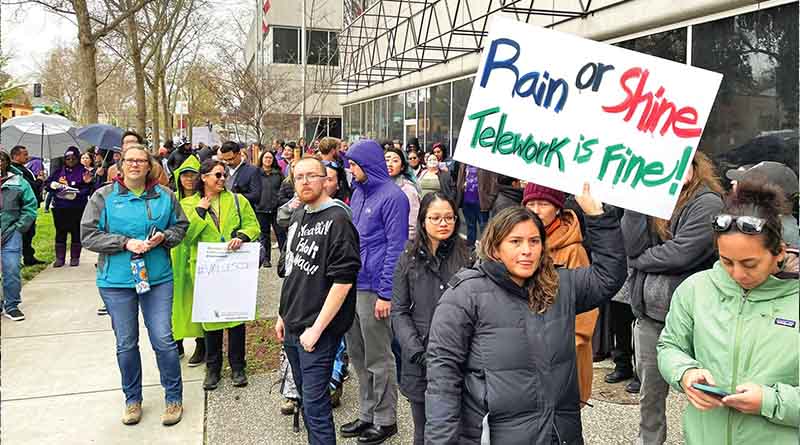SEIU fights against state’s return-to-office mandate
By Sheri Williams
Thousands of SEIU 1000 members who work for the state of California rallied at the Capitol recently to protest an unfair push to end remote work and force union members back into office buildings.
“Remote work didn’t break the system. It improved the system. It exposed the system,” said Sacramento Central Labor Council President Fabrizio Sasso. “It showed we can do our jobs with flexibility, with balance, with dignity, but they want to snatch it back.”
SEIU said that remote and hybrid work has actually improved productivity and saved the state money.
“Governor Newsom’s return-to-office (RTO) mandate isn’t about improving services—it’s a shortsighted decision that disregards what’s best for workers and the state,” the union said in a newsletter. “We’ve proven that remote and hybrid work increase productivity, save taxpayers millions, and help recruit and retain talent. Yet, instead of building on these successes, the administration is pushing unnecessary commutes that disrupt workers’ lives.”
Many state workers have been working remotely or in hybrid situations since the pandemic. The union points out that this system has effectively kept state business running with no disruptions, while at the same time improving quality of life for workers.
The union said that in 2022, California eliminated 767,000 square feet of office space, saving $22.5 million per year due to reduced in-office staffing. That same report projected that expanding telework could save the state $85 million annually over three years. Additionally, a 2023 Government Accountability Office report found that telework expands the hiring pool and helps fill vacancies—something every state agency is struggling with.
“We are in a fight for our future,” said SEIU 1000 President Anica Walls. “Governor Newsom’s forced return-to-office mandate threatens the progress we’ve made, and our hard-earned 4% raise is still at risk. SEIU Local 1000 is taking legal action to stop this reckless RTO policy and is holding lawmakers accountable to push for our full 4% pay increase this July.”
Walls was referring to a 4% general salary increase for state workers scheduled for July 1, 2025. However, that increase will depend on the final state budget.
A 3% raise is guaranteed, but SEIU 1000 members point out that it doesn’t even keep up with the cost of living.
“State workers shouldn’t be left in limbo—we need certainty about our pay,” the union said. “We won’t back down until every state worker gets the full 4% we deserve.”
